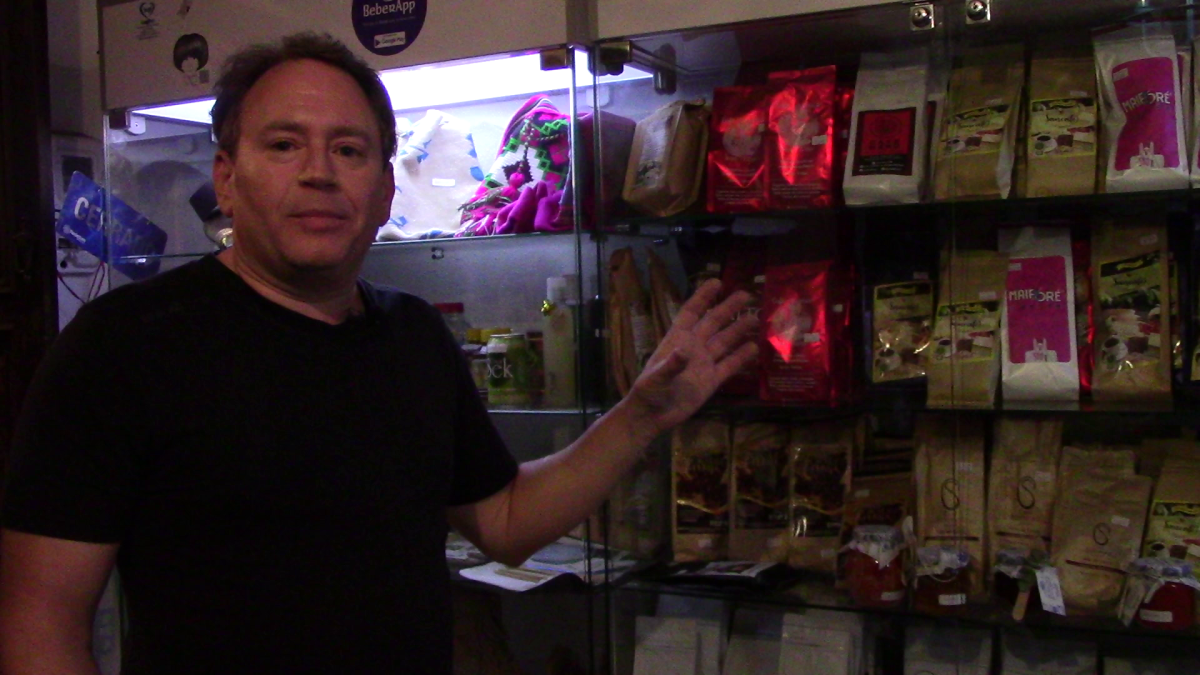ASU professor filmed lectures from Colombia in midst of COVID-19 outbreak

ASU Instructor Charles Ripley lecturing on how ex-combatants from Colombia's civil war are being incorporated into society by producing local products such as coffee, clothes and beer in Café Pushkin.
At the beginning of the COVID-19 outbreak, Arizona State University Instructor Charles G. Ripley was in Bogotá, Colombia.
Learning that classes were going to be transitioned online, the School of Politics and Global Studies instructor jumped into action to ensure that he had the most interesting lectures to engage students in the virtual class.
Ripley, who was in Colombia over ASU’s spring break, decided he would film his lectures from his Airbnb. In addition to these recordings from the fifth-floor apartment, Ripley created short videos in various locations throughout the city.
“It turned out great and I was able to use it in a number of courses such as global politics and national security,” Ripley said. “These on-the-ground lectures made the online transition easier.”
According to Ripley, Colombia continues to be in shut down with signs of small openings.
“Luckily, I made it home safely in March when everything was closing up.”
With the spring semester now over, Ripley took some time to reflect on the experience and discuss plans for the future.
Question: How will trips like this help your classes in the future, particularly in fall?
Answer: In fall, I am teaching globally-oriented courses such as POS 361: National Security; SGS 340: Violence, Conflict, Human Rights; and POS 160: Global Politics. I always film lectures abroad to make my online and even in-person courses more interesting. I have filmed from protests in Colombia and Nicaragua, to a spooky famous cemetery (La Recoleta) in Argentina. This time around, I filmed lectures in two memorials: One for Dilan Cruz, a student who was lamentably killed during Colombian protests, and another in the Nogal nightclub, the site of a 2003 terrorist attack attributed to the guerrilla group FARC-EP. I also did one on religion and politics deep in the salt mineof Zipaquirá. The feedback I have received is extremely positive. The lectures really bring international experiences to the students!
Q: Why did you go to Colombia in the first place?
A: I was making relations with Colombian nongovernmental organizations and universities to connect with local sponsors. There are a number of grants that require local scholars. I have worked with the NGO Nuevo Arco Iris previously and have given talks at Colombian universities. The goal was to deepen these relations. This is also great exposure and a funding opportunity for the university. Unfortunately, everything came to a complete halt, but I am optimistic for the future.
Q: Will you will be returning to Colombia?
A: I will be. In addition to making relations, I plan to film lectures in Medellin. This would track the development of the career of Pablo Escobar, all the way to his former luxurious ranch “Hacienda Nápoles” (“Naples Estate”). This would be a fascinating lecture for the students, as long as I do not run into Escobar’s hippopotami, which have now adapted and multiplied throughout the area. I did a lecture on the River Magdalena before, but did not see them. Guess I was lucky!
More Law, journalism and politics

A new twist on fantasy sports brought on by ASU ties
A new fantasy sports gaming app is taking traditional fantasy sports and mixing them with a strategic, territory-based twist.…

'Politics Beyond the Aisle' series to explore the stories of public officials
In an effort to build a stronger connection between students and political and civic leaders, Arizona State University’s School…

ASU committed to advancing free speech
A core pillar of democracy and our concept as a nation has always been freedom — that includes freedom of speech. But what does…

